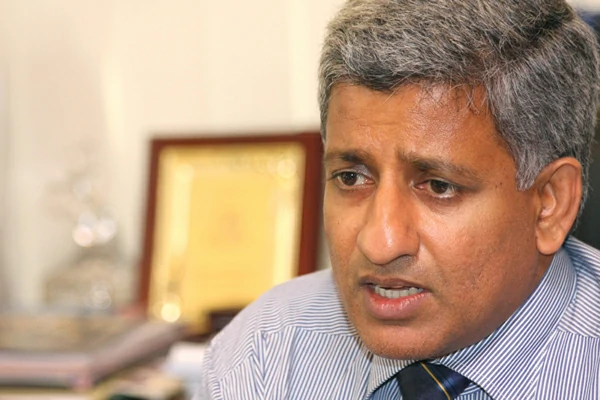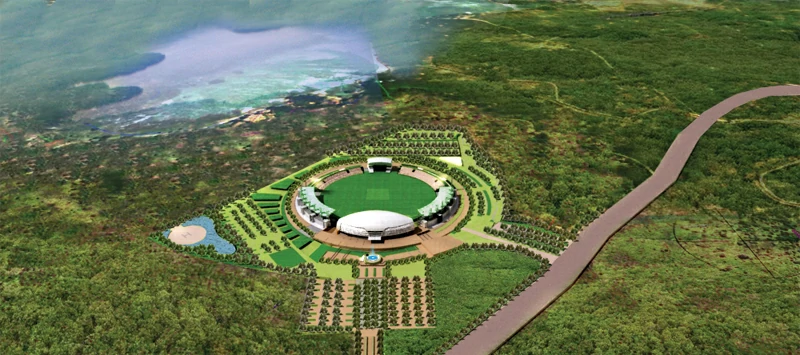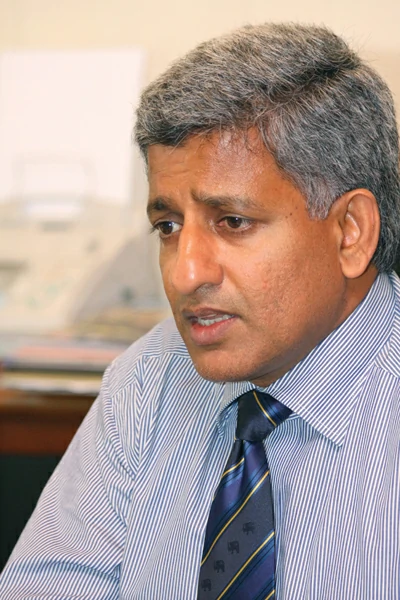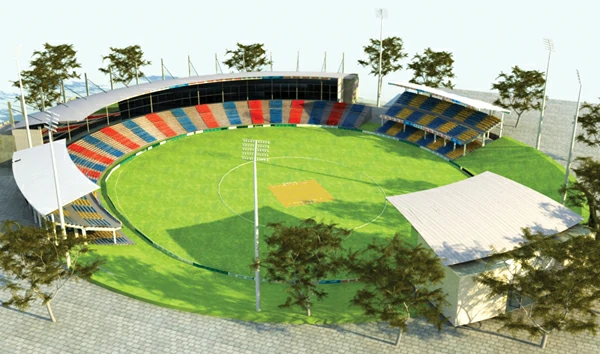
Sri Lanka Cricket is going through a period of change, where professionalism and modernisation of the game has been identified as the key areas. With Sri Lanka co-hosting the 2011 ICC World Cup, the country is gearing itself to witness the crème of international cricket on home ground.
Nishantha Ranatunga, Secretary of Sri Lanka Cricket spoke to Business Today about the changes made within Sri Lanka Cricket by focusing on positive progression.
By Udeshi Amarasinghe
Photography by Menaka Aravinda
Can you tell us about your appointment as the Secretary of Sri Lanka Cricket?
My background is in Marketing. Prior to being appointed as the Secretary of the Sri Lanka Cricket by President Mahinda Rajapaksa, I held the position of Director General of Rupavahini Corporation, the national television channel. Therefore, with my experience in the marketing field as well as in the game of cricket my aim was to look at a progressive path for Sri Lanka Cricket without dwelling in the past. Since Sri Lanka is to co-host the ICC World Cup in 2011, we had to prepare ourselves in terms of the game where the Sri Lanka cricket team has to perform well and in terms of infrastructure and facilities in order to cater to the high standards required.
While Improving The Facilities Of The Players, We Are Also Focusing On Infrastructure Development. We Have Five Cricket Bases Today Namely, Galle, Kandy, Kurunegala, Moratuwa And Keththarama.
Can you elaborate on the measures taken since you took over the post?
We have focused on administrative areas. Administrative policies have been put in place to ensure that the Board works more efficiently and effectively. Financial guidelines and processes have been established to ensure financial discipline within the organisation. Recruitment of qualified persons in different areas has also been an important aspect that we have focused on. In terms of administration these are the areas that we have addressed.
Looking at the game, previously we had only 25 professional cricketers in this country. We have increased that number to 75. Once these cricketers are in the system we provide them with coaching and infrastructure facilities. We ensure that all the facilities that were provided to the top players during their time are also provided to the 75 players selected. During our time we went to office and worked till about 3 pm and then went for practices at 4 pm, which lasted for about 1 ½ to 2 hours. This is how we played the game. Now things have changed. The players are fully professional and are paid a very good salary. For example we recruited 15 school leavers and pay them approximately Rs 50,000 in salary. They are fulltime professional cricketers.
The morning sessions include general practices and then a work out at the gym. Thereafter the players are allowed to go home and rest or stay at Keththarama. In the evening they will attend batting and bowling practices. Thus by professionalising the game the commitment from the players is very much more. To support the players we have acquired the services of very good coaches. Romesh Kaluwitharana is the A team coach, then Nawab Nawaz is the under 19 coach and we have Upul Chandana as the fielding coach.
In order to provide exposure to the players we have increased the number of tours. We secured three tours for the A team and two tours for the under 19 team this year. Therefore we are giving them exposure to compete with the top national players and get into the system.
While improving the facilities of the players we are also focusing on infrastructure development. We have five cricket bases today namely, Galle, Kandy, Kurunegala, Moratuwa and Keththarama. We now have five Provincial centres that are managed by Provincial Managers who will be looking into the various aspects of the game.
We have also focused on improving the National Women’s team by contracting 30 players for the first time with a view of bringing professionals to the field. Furthermore we are enhancing facilities and have recruited a coordinator and qualified supporting staff to ensure the wellbeing of the players.
Improvements were made in other areas of Sri Lanka Cricket Board such as HR, IT and Security. Can you elaborate on these changes?
Yes, Sri Lanka Cricket consists of over 200 employees. However we were lacking in a Human Resources department to train and harness the skills of the employees. Therefore we recruited a qualified HR Manager and many other changes are being done to improve the employee culture at the Sri Lanka Cricket Board.
Furthermore Sri Lanka Cricket is an entity, which is highly reliant on IT, but we did not have an IT Department. Therefore we made the decision to recruit a qualified IT Manager and to form an IT Department so that players will have the benefit of having access to the latest technologies like in other countries. We followed recruitment procedures to ensure that we attract the services of the best professionals in the relevant disciplines.
After the unfortunate incident, which unfolded in the streets of Lahore, Pakistan, players’ safety and security became the most vital aspect. Thus to meet the requirement we have recruited a security consultant who is qualified and experienced in the field. Priority is always given to the security of players, officials and spectators though the cost may be high.
How have these measures reflected positively in the performance of the players?
There is a great improvement in performance. We have done well during the T20 last year, in England we were the runners up and we played well against the Indians in Sri Lanka. We have seen a great development in the under 19 age group; that is where our main focus is. Three years ago, we played against Bangladesh and lost but this year we nearly qualified into the semi-finals in the under 19 ICC World Cup. Therefore we can see a good future for the young cricketers in the time to come.
Looking at the new HR system in place, all employees are evaluated on a regular basis. Furthermore, we have a mechanism to address any grievance of an employee and due to that the service efficiency of employees has improved greatly. The HR Department conducts numerous skills enhancement programmes as well. For the first time in its history Sri Lanka Cricket has a proper organisational structure where employees can prove their capability and can advance in a career path within the organisation.
An Engineering Division has been established to overlook and manage all infrastructure related projects. With so many venues coming under the purview of Sri Lanka Cricket, it was of paramount importance for us to have an arm with qualified engineers to match up with other international bodies.
In terms of IT, Sri Lanka Cricket is now online and is widely accessible. We are offering numerous services to Cricket fans. We have also set up our first SMS based news feed system using the skills of our IT team. Their skills are also being used extensively to improve our player analysis systems so that we are on par with all other major test playing nations.
Sri Lanka will be co-hosting the 2011 ICC World Cup, what preparations are being done?
Firstly we are preparing ourselves to win the World Cup, which is the most important thing; the players are focused, the coaches are committed, selectors are doing a marvellous job and from an administration point of view we have given them all that they need in terms of facilities and infrastructure. Secondly, we are looking at the financial benefits that come along with the ICC and position ourselves to develop our venues utilising those funds. We are focusing on building infrastructure with minimum cost, in order to leave the legacy of the World Cup for the future generations.
For The First Time In Its History, Sri Lanka Cricket Has A Proper Organisational Structure Where Employees Can Prove Their Capability And Can Advance In A Career Path Within The Organisation.
We are developing three grounds; Pallekele in Kandy, Hambantota and the main one is the Keththarama Stadium in Colombo. We are developing Keththarama to accommodate 30,000 spectators, as a quarterfinal and a semi-final game will be played there. The objective is to try and do this work with minimum cost. We should be thankful to His Excellency the President for giving us an opportunity to work with the Government organisations. All the contractors are hired through the Sri Lanka Engineering Corporation and the Sri Lanka Army in terms of labour also supports the construction work. The cricket grounds in Hambantota is developed by the Sri Lanka Ports Authority, they are the main contractors. In that way we have the assistance of the Government organisations to assist us in those areas. Thirdly we are looking in the angle of Sri Lanka as a tourism investment destination, as the games are played. Therefore these are the three main areas we are working on.
We look at this as a great opportunity to showcase our country in this post war era to the international community and for the country to attract more tourists. Upon successful completion of the event, international confidence building will take place and this will leave a legacy for many international events to take place in our country.
How is the progress so far?
Representatives of the ICC came and inspected the infrastructure about a month ago and they were very happy with the progress we have achieved. We are quite positive that we will finish the stadiums by September this year. We have a tour before the World Cup, the West Indies are coming to Sri Lanka, our intention is to try and play games during this tour at the World Cup locations in Sri Lanka.
Sri Lanka will be hosting 12 matches, can you tell us where the matches will be held and who will be playing?
Yes, we are hosting a total of 12 matches of which three will be played in Hambantota, four at Pallakelle and the remaining at Keththarama. Matches between Canada, Pakistan, New Zealand and Sri Lanka will be played at these locations.
What is the significance of Sri Lanka co-hosting the 2011 ICC World Cup?
It is a great opportunity for the entire country as it is a very prestigious tournament and one of the best in the sporting arena. We are honoured and privileged to be a part of it. It is not only for Sri Lanka Cricket, but for the entire country to be proud of. We are confident that we will have a great tournament for the country and for the world.
ICC has recognised the Sri Lanka Cricket Board through its various appointments. Would you like to elaborate on that?
The ICC has faith in the Sri Lanka Cricket Board. They have gone to the extent of appointing me to their ICC Development Committee and the Hony Treasurer of Sri Lanka Cricket Board Sujeewa Rajapakse as the Treasurer of the Central Organising Committee (COC) of the ICC World Cup 2011 where once again I have been appointed a member.
The ICC has made these appointments because they have confidence in our administrative body.
Finally, looking at the future, what is the role of Sri Lanka Cricket?
We have a very large role to play. Cricket currently attracts many sports tourists into the country. We can do much more to increase the popularity of the sport and make a niche in the world cricketing map. Even currently as much as 200 cricketers from our system participate in league competitions in England and Australia; therefore we would like to build upon that and make cricket a profit centre for our country. We wish to be a vibrant partner in nation building in this post conflict era.








